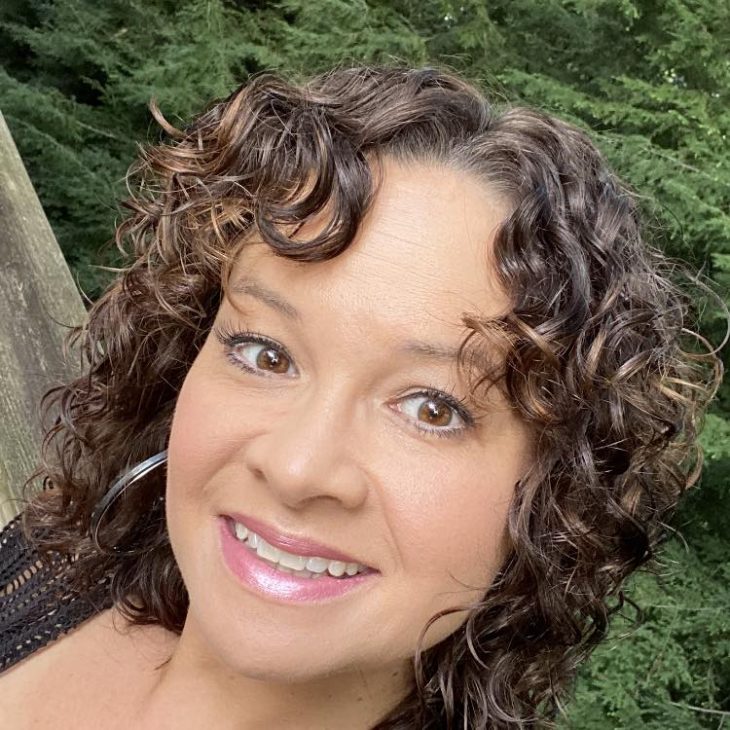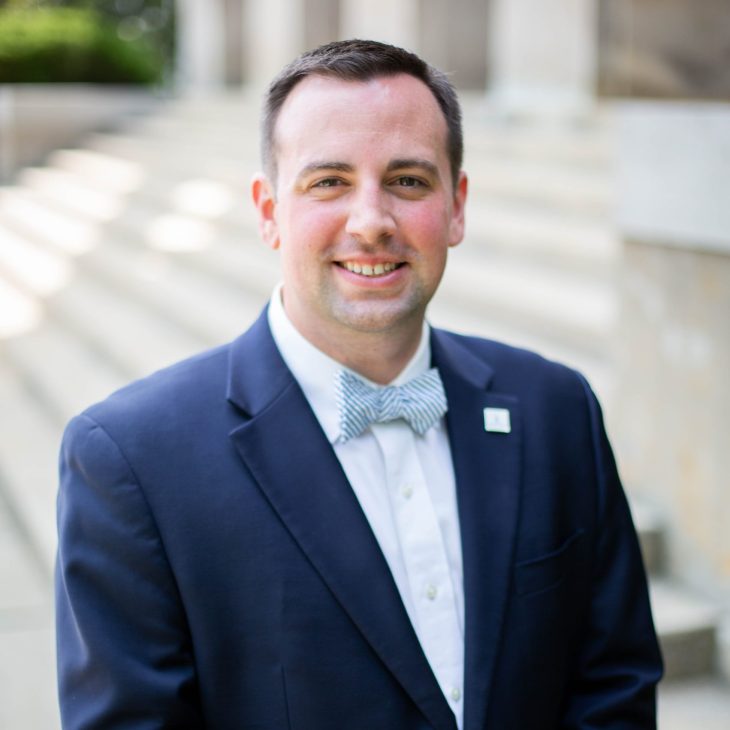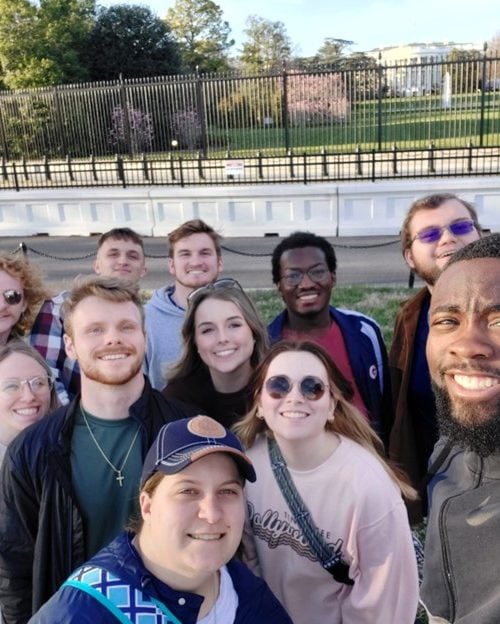Bluefield University is located in the picturesque Appalachian Mountains on the border of Southwest Virginia and Southern West Virginia.
Founded by the Baptist General Association of Virginia (BGAV) in 1922, they envisioned the institution as the educational jewel in the community’s crown of progress during this decade of growth. They built the campus around a natural gravity hump for the burgeoning Norfolk-Western railroad. This area grew into a commercial, legal, banking, educational, and warehousing hub of the once-booming coalfields and rural farming communities. As such, the region was once home to residents of many different ethnic backgrounds, creeds, and national origins seeking to make their profits, who created a rich and diverse history for the community.
Despite its Baptist heritage and creating a “Christ-centered learning community,” the parents of youth in the rising middle and upper class proudly enrolled their children in a liberal arts education, which included students of Jewish and Catholic faiths learning alongside other Protestant denominations.
Partnerships were established with houses of worship in the area to provide a robust education with faith at the center. An example of these partnerships includes one with the local synagogue for teaching Hebrew and understanding Jewish culture. It created close relationships that cemented longstanding collaborations between the University and the Jewish community in the area.
Late in the 20th century, recruiting doctors and medical providers to the area’s two major regional medical centers helped create new relationships with the local mosque and other faith groups. As it was, conversations and discourse on issues of religion, interfaith dialogue, and religious liberty have naturally taken place over the history of Bluefield University. However, the impacts of a distressed coal industry, the consolidation of hospitals, shifting demographics, and aging populations have led to many of these groups scattering from the region in recent years.
Interfaith Conversations at Bluefield
In 2016, professor emeritus Dr. Rob Merritt was offered a unique opportunity by the Council of Independent Colleges (CIC) and Interfaith Youth Core (now Interfaith America) while he was still teaching. The opportunity kindled his passion for religious inclusion. Merritt was one of 26 private college professors selected to participate in a five-day seminar on “Teaching Interfaith Understanding.” The seminar, led by prominent scholars like Eboo Patel, founder of Interfaith America, and Laurie Patton, president of Middlebury College, aimed to broaden the educators’ knowledge and strengthen their skill of teaching interfaith understanding by creating new curricula and resources.
Following the seminar, Merritt hosted “Building Bridges,” a gathering sponsored by the Appalachian Interfaith Alliance, which promotes interfaith unity through community service. Events like this became one of many interfaith activities spearheaded by Merritt at Bluefield University in the following years.
The timing was appropriate as the greater community noted the decline in its diverse faith communities that decade. In a feature story, the Bluefield Daily Telegraph, the regional newspaper, stated the dwindling population of Jewish worshippers. Later, the synagogue would close its doors and sell the building to a Montessori school, thereby marking the end of its enduring presence in the community. On campus, students at the institution participated in World Hijab Day to show kindness to a fellow student who was a practicing Muslim attending the University. Feedback from campus constituencies questioning the event’s purpose opened the eyes of faculty and staff to the need for more conversation on interfaith awareness.
Utilizing “Building Bridges“: An Interfaith America Grant
During the 2022-2023 academic year, Bluefield received funds to restart interfaith dialogue following a break during the COVID-19 pandemic. As part of the grant, experiences, and dialogues focused on racial equality and interfaith awareness took place on campus. Field trips to the Greenbrier County Historical Society and North House Museum, an interfaith panel discussion featuring religious leaders from across the Appalachian region, and an interfaith awareness forum moderated by a budding poet, author, and podcaster were just a few of the activities that students took part in during the year. These events led to rekindled relationships with local faith leaders, all of whom expressed a desire to partner with Bluefield University on initiatives that reflected shared values of peace, charity, and service.
However, one event stood above the rest in its impact.
Dr. Tracey Stout and Dr. Shawn White, Christian Studies faculty, in collaboration with Sherelle Morgan, Coordinator for Belonging, coordinated a field trip to Washington, D.C., as the concluding event for the year. Planned as an immersive experience of national museums, students also met with those working on religious liberty issues in our nation’s capital. At the Baptist Joint Committee for Religious Liberty (BJC), students participated in a workshop experience with staff using the recent case study of a high school football coach sued for leading prayer on the field. The meeting expanded students’ minds to consider the complexity of the issue but also the importance of individual religious liberty. Museum experiences included visiting the United States Holocaust Memorial Museum and the National Museum of African American History and Culture.
The trip created several layers of impact. For some students, it was their first opportunity to leave the local area of Bluefield and experience a new and urban location. Conversations and thought-provoking questions asked by chaperones during the trip took place while going to dinner and on the six-hour ride back to campus. Students discussed various topics, including the definition of religious liberty, universal themes across belief systems, and opportunities for collaboration within the interfaith community. Jonathan Collier, a third-year Christian Studies major, expressed his perspective: “I believe that many of Jesus’ teachings, such as loving your neighbor and not holding grudges, are universal and are shared by all belief systems. No matter where you’re from, most of us want to live our lives and take care of our families and the people we care about.” The academic year concluded with a pizza party and a debrief session with students highlighting their key takeaways from the trip.
Due to the impact of the grant and the year’s programming, students have already begun asking when the next interfaith experience and field trip will occur. Their hunger for immersive learning and honest conversation inspires university officials to create more dialogue on interfaith awareness with a new generation of students, new partners, and new formats in the years ahead.

Sherelle Morgan
Sherelle Morgan, Director of Alumni Relations at Bluefield University since 2022, initially joined in 2015 as Director of Online Enrollment. Sherelle is also the Coordinator for Belonging, driving BU’s equity and inclusion efforts, chairs the Diversity & Multicultural Committee, and serves as an adjunct instructor for the business school.

Josh Cline
Since his freshman year in 2005, Joshua Cline has been part of the work of many working toward the mission and vision of Bluefield University, his beloved alma mater. He is currently the Vice President for Institutional Advancement and Marketing but has previously served as a Trustee, member of the Alumni Board, Director of Alumni Relations and Annual Fund Giving, Advancement Officer, and student representative on institutional committees. He is passionate about students receiving opportunities to broaden their horizons and one-on-one counseling in academics, faith, and life matters as they navigate university life just as he did as a student.
“Building Bridges, Deepening Faith” campus grants were made possible by generous support from the Arthur Vining Davis Foundations and The Pew Charitable Trusts.




